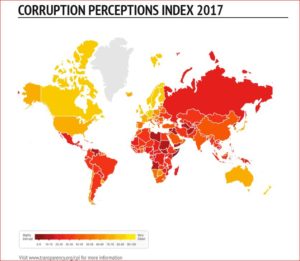Global Corruption Index: Keep Your Nose Clean Doing Business Abroad
There is corruption in this world we share. This is not exactly a startling statement, yet it’s one that seems to surprise both seasoned and novice entrepreneurs on a regular basis. For many years, Transparency International has been publishing its ranking of the level of corruption within the world’s nations. Not surprisingly, there are more countries that carry corruption warnings than those considered less corrupt.
No country received a score of 100 or pristine; indeed, none received a score above 89, which was assigned to New Zealand. Denmark received an 88, placing her in second place on this index. But which countries are the other end of the spectrum? The most corrupt place on the globe is assigned to Somalia, which was given a score of 9—dead last of 180 nations.
What of the BRICS countries, those five with emerging economies: Brazil, Russia, India, China and South Africa? South Africa was identified as the least corrupt business environment. And perhaps unsurprising, Russia is the most corrupt.
- Brazil was assigned a score of 37, ranked number 96
- Russia was assigned a score of 29. ranked number 135
- India was assigned a score of 40, ranked number 81
- China was assigned a score of 41, ranked number 77
- South Africa was assigned a score of 43, ranked number 71
And the United States? It received a score of 75, tied with Belgium and Austria for 16th place on the Transparency International list.

What Does This Mean and Why Should I Care?
Transparency International’s index measures corruption as well as the ability of the fourth estate—journalists—to report on the activities of the government and business in general. Many nations have and continue to limit the freedom of journalists, or have allowed an environment to evolve in which journalists are silenced.
This index should be one of many tools used by every entity looking to do business in those countries with a score of 60 or less, which comprise countries 36-180—not so much as a red flag signifying a no-go zone for business, but as a warning to do more research before dipping your toe into what may be a corrupt quagmire of business practices. Just because it is accepted and expected business practice in a given country, does not mean a U.S. citizen or company listed with the U.S. Security Exchange Commission will not run afoul of U.S. laws.
The FCPA, DOJ’s Hammer Against Corruption
The U.S. Department of Justice (DoJ) continually prosecutes businesses for engaging in corrupt business practices. The list of DoJ cases associated with the Foreign Corrupt Practices Act (FCPA) touches many countries, sectors and individuals, some of whom are U.S. citizens, with each highlighting how a company had engaged in corrupt business practices in the conduct of business abroad.
For example, in January 2017, the Southern District of Texas saw a number of cases associated with energy companies engaged in providing bribes to government officials in Venezuela to obtain business. Meanwhile, a Luxembourg corporation pleaded guilty to maintaining false books associated with its Mexico-based biomedical company, resulting in the payment of fines of more than $17 million.
Thus, every entities ethics officer (or designee) should be focused on ensuring the business practices of every employee are aboveboard and don’t run afoul of the FCPA or other anti-corruption legislature present in other countries. As noted above, accepted business practices aren’t always legal business practices.
Looking for a little light reading? Here is the complete list of 23 FCPA prosecutions in 2017 and here is the complete Transparency International Index.





